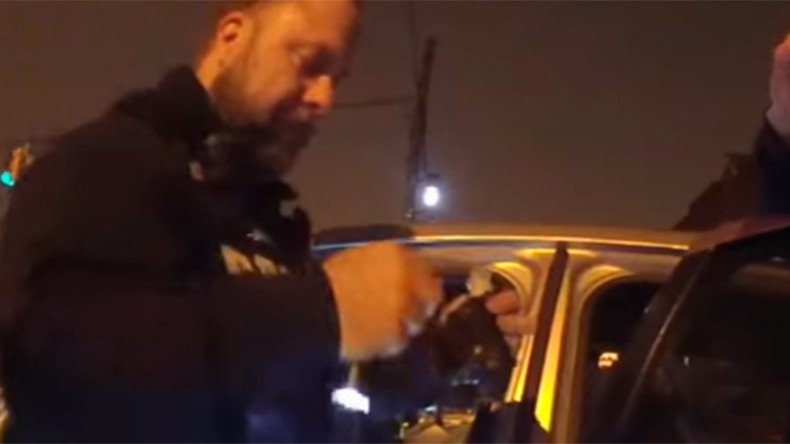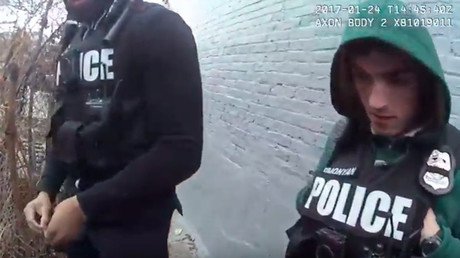Here we go again: Another Baltimore Police body cam allegedly shows drugs being planted (VIDEO)

The Baltimore Police Department have launched an investigation after body cam footage allegedly showed officers planting evidence at the scene of a crime. It’s the second such probe in two weeks.
Josh Insley, a local defense attorney, gave the footage to the Baltimore Sun Tuesday, which he said shows officers “engage in what appears to be a staged recovery of narcotics.”
The footage shows seven officers searching the car of Insley’s client, Shamere Collins, on Nov. 29, 2016. Halfway through the footage, the officer is seen turning off his body camera. When the footage is turned back on, the officers quickly find bags of heroin and marijuana where an officer was searching previously.
The Maryland Public Defender’s Office (OPD) confirmed the video’s existence Monday when announcing drug charges against Collins were being dropped. The OPD said the footage “appears to depict multiple officers working together to manufacture evidence.”
The officers were not named, but the OPD said they were not the same officers involved in the video that emerged last month and recorded in January.
An OPD spokesperson told the Sun that the videos show that “after the car has been thoroughly searched, the officers turn off their body cameras and reactivate them. When the cameras come back on one officer is seen squatting by the driver’s seat area. The group of officers then wait approximately 30 seconds.”
UPDATE: @BmoreDefenders describe the new body camera footage they announced having yesterday: pic.twitter.com/1f0Zft1srh
— Kevin Rector (@RectorSun) August 1, 2017
The body cameras used by the BPD are designed to automatically capture 30 seconds of footage prior to the device being activated. The footage that is captured in those 30 seconds, known as a “buffer,” contains no audio.
“Shortly thereafter, another officer asks if the area by that compartment has been searched. Nobody responds, and the officer reaches in and locates a bag that appears to contain drugs right by where the prior officer was, and where the car had been thoroughly searched about a half an hour prior with absolutely no results,” the OPD statement continued.
Prosecutors dropped all charges against Collins on Monday, but Insley said he would pursue legal action against the BPD, according to the Sun.
“Those drugs were not in that car when we were pulled out, the state dismissed the case against me and my attorneys are reviewing the tapes to see what steps to take next,” Collins said in a statement, according to the Sun.
TJ Smith, a spokesman for the BPD, said that no officers were suspended in connection with the incident, according to CNN. However, OPD said that two officers have been referred to Internal Affairs, adding they “had questions” about the body cam footage.
"Before we blanketly characterize their behavior as deceptive and or a credibility issue, we referred the matter to the Internal Affairs Division of the Baltimore Police Department,” Melba Saunders, a spokeswoman for the PDO said in a statement.
In a media briefing Wednesday, Baltimore Police Commissioner Kevin Davis defended his officers, telling reporters that the department is experiencing “growing pains” adjusting to the new technology.
"I do know it's not healthy to jump to a conclusion that officers did something criminal just because their camera was off," Davis said
He added that while the BPD has captured 121,000 hours of body cam footage, they have only sustained 14 misconduct cases from the start of the program.
On Tuesday, Davis issued a memo, reminding officers they must activate their body cams when they are called for service and keep them on until they leave the scene.
“In the event your body worn camera is not activated during the recovery of evidence, under no circumstances shall you attempt to recreate the recovery of evidence after re-activating your body worn camera,” Davis wrote.
BREAKING: @CommishKDavis has issued memo warning officers not to "recreate the recovery of evidence" if body cameras aren't on in 1st place. pic.twitter.com/0ZqOcJPkLx
— Kevin Rector (@RectorSun) August 1, 2017
Last month, the OPD released footage that showed an officer placing a bag in a pile of trash in an alleyway before leaving the alley to join two other officers who were standing by. Moments later, the officer re-enters the alley and uncovers the bag that was just planted.
The footage that was captured contains no audio for the first 30 seconds, meaning the officer probably did not know about the 30 second buffer that BPD body cams record before the officer begins recording.
2 Baltimore detectives plead guilty to racketeering https://t.co/LIhL4Z7qURpic.twitter.com/ZB0vhMupQo
— RT America (@RT_America) July 22, 2017
Prosecutors dismissed charges in 34 cases that relied on testimony from the officers involved in the incident.
“The credibility of those officers has now been directly called into question,” Marilyn Mosby, the state’s attorney for Baltimore, said in a news conference Friday, according to the New York Times.













